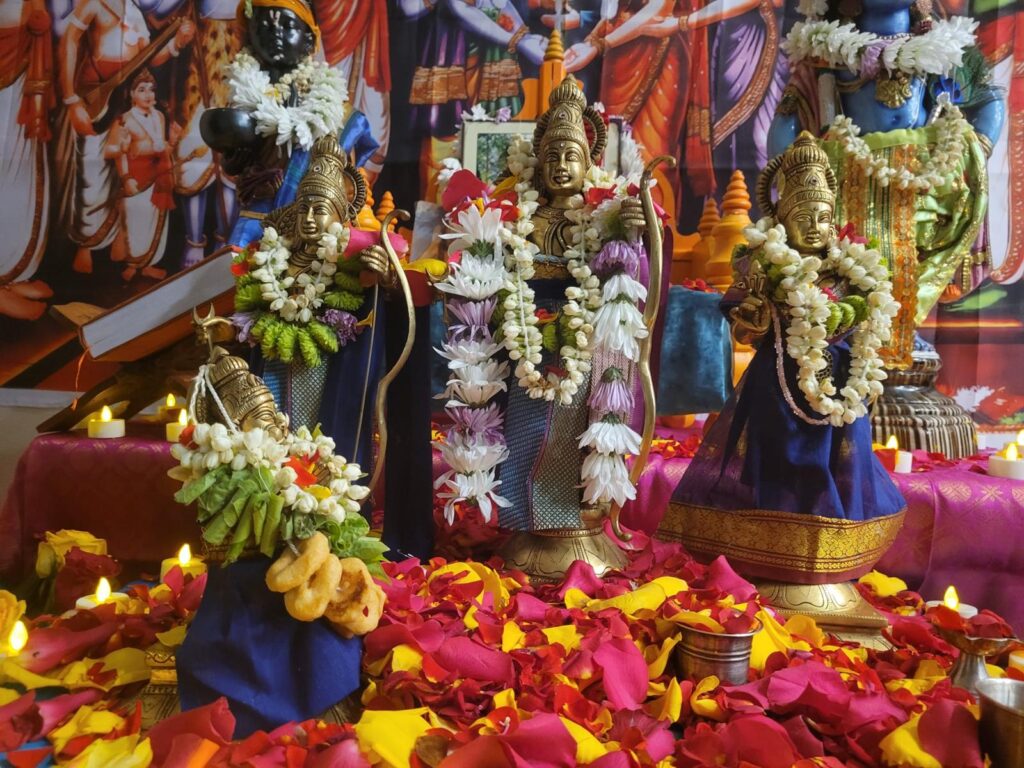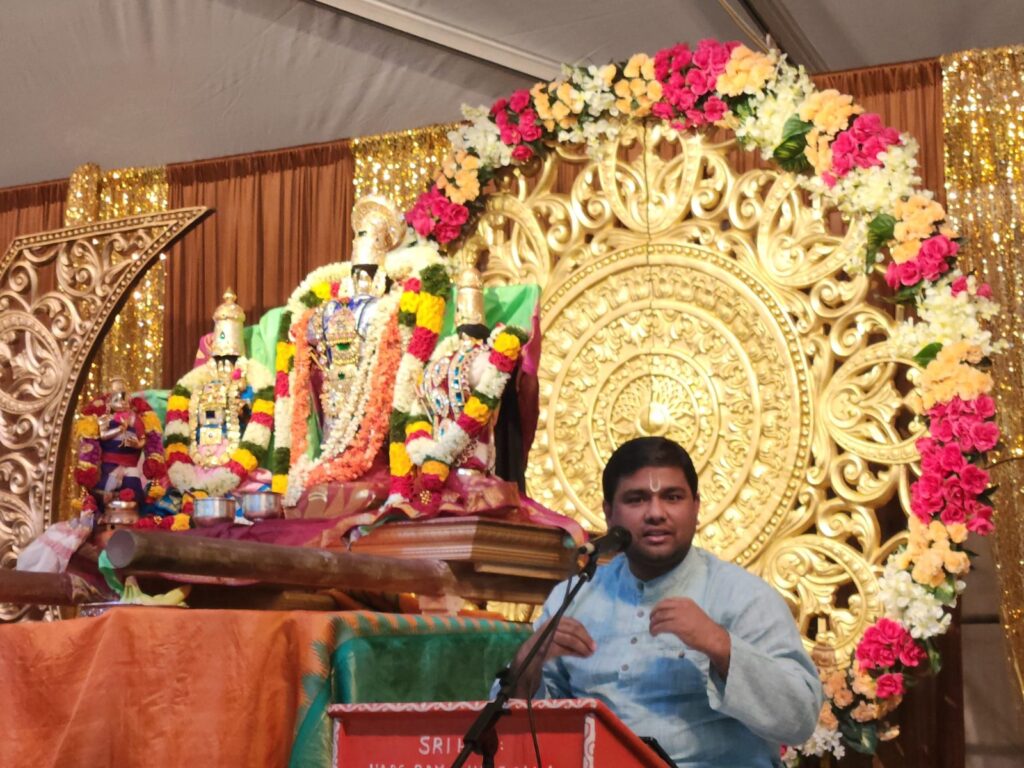Alone in a distant land, separated from her beloved and surrounded by foes at Ashoka Vana, Sita Devi held on to life constantly meditating on Him, with the only hope that her Lord Shri Rama would reach out to rescue her. In her helpless state, as she was struggling to keep her hopes up, she suddenly heard a soft voice singing the story of her Lord, speaking highly of his greatness and valor (raamam akliShTa karmaaNam sva bandhum anukirtayan). It was none other than Hanumanji, who had come there as an emissary at Lord Rama’s behest. He was trying to win her confidence to reassure her of the Lord’s efforts to rescue her. What better way to do it than Kirtanam of the Lord’s glory and what else could possibly suffuse Sita with hope and strength other than listening to it from His greatest Bhaktha?
 shravaNam kIrtanam vishNOh smaraNam pAda-sevanam archanam vandanam dAsyam sakhyam Atma-nivedanam
shravaNam kIrtanam vishNOh smaraNam pAda-sevanam archanam vandanam dAsyam sakhyam Atma-nivedanam
In the above famous shloka from Srimad Bhagavatam, Prahlada, who is considered the Emperor of all devotees, stipulates nine types of devotion or nava vidha bhakti. It is no surprise that the list is led by Shravanam, or Bhakti in the form of listening to the Lord’s name and His greatness.
The greatest testimony to this lies in the very premise of how Srimad Bhagavatam came to be known to the world. King Parikshith, the son of Abhimanyu and a notable scion of the great Pandava dynasty, once slighted a sage who was in samadhi, and was cursed by the sage’s son that he would die of a snake bite in seven days. Parikshith, though repentant of his hasty act, could do nothing to reverse the curse; hence he sought to make his last week on earth most meaningful. When sage Shuka approached him, he sought his advice, and it was then that Sage Shuka narrated to him the whole of Srimad Bhagavatam. Parikshith thus spent his last days immersed in listening to the Lord’s name and stories and it was that shravana-bhakti that led him to moksha.
So how can ordinary mortals like us aspire to possess such great levels of Bhakti? By making Bhagavan Nama Shravanam (listening to the Lord’s Name), and consequently, Bhagavan Nama Smaranam (thinking of the Lord’s Name) a constant in our day to day lives. More importantly, we are also faced with the immense responsibility of sowing the seeds of bhakti in the younger generation – our children. When is a good time to put this idea to practice? Even before the child is born, science-backed research would say. A baby’s sense of hearing begins to develop right from its fetal stages, and after the child is born, he/she displays marked signs of recognition and familiarity to sounds(music, verses etc) that he/she was exposed to while in gestation. A child’s mind, during ages three through ten is quite like a sponge, it is believed, figuratively implying that its ability to absorb information is unlimited. Years before a child actually becomes accustomed to the process of being “taught” something, he/she has traveled miles in the journey of “learning”. This does not imply creating a childhood that is constantly preachy and pedantic. It simply requires us, as parents to create a loving environment where goodness and Bhakti can be learnt by “observation” and “listening” and not “teaching”.
The qualities and attributes of children are a direct representation of the environment they thrive in. Constant exposure to sat-vishayam, be it witnessing thoughtful acts of kindness, or listening to stories of the Divine Lord and his Bhaktas, leave deep, indelible imprints at a young age. The fruit of this kind of nurture actually manifests itself in the later years, when even after life has taken them on varied courses, the children never forget the values imprinted on their minds in their childhood. This can happen only when the seeds are sown truly well, and the roots have run truly deep and gripping.
As our Guru Maharaj points out –
ashTAnga yogatthin uththama palanaiyum
thaTTAmal neeyum aDaindiDave
kashTam vilagi ishTam kaikooDa
kAlathai nashTamAkkAmal kadhai keLu
Kadhai keLu Kadhai keLu
sadA hari kadhayai nee keLu
bhakti viraktiyuDan kadhai solbavariDam
shraddhA bhaktiyuDan kadhai keLu
To attain the supreme fruit of ‘Ashtanga Yoga’; to get rid of your travails and get your wishes fulfilled, O! Ye! Listen to His Stories! O! Ye! Listen to Lord Hari’s Stories always, from one who is dispassionate and devoted! Listen with devotion and dedication!
Pavithra Radhakrishnan, Minneapolis, MN







Simply great…Nice Analysis on Sravanam